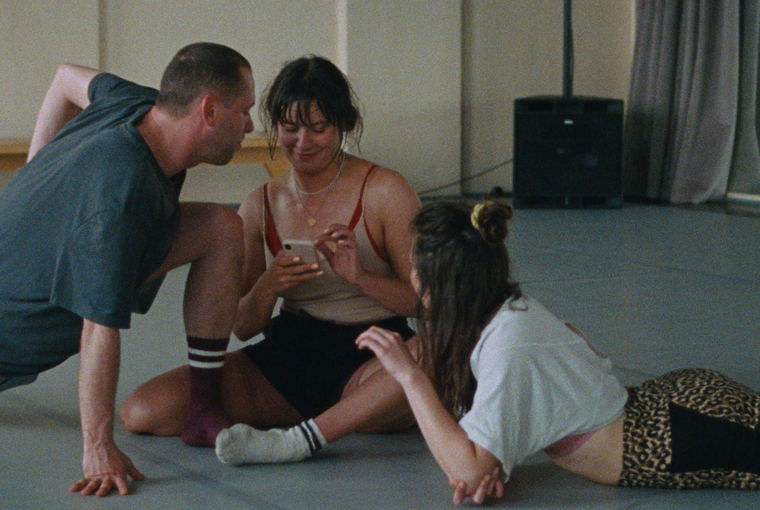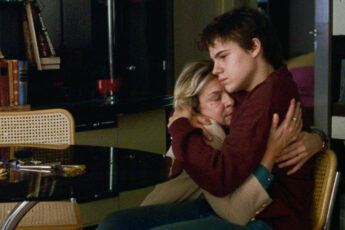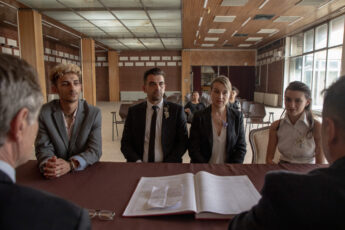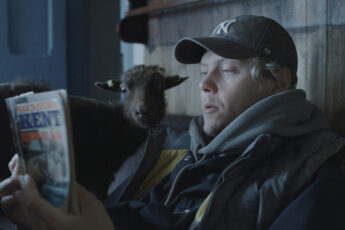Semiotic Sexuality
Marija Kavtaradze’s Slow (Tu man nieko neprimeni, 2023)
Vol. 138 (October 2023) by Colette de Castro
Elena (Greta Grineviciute) is a contemporary dancer based in Lithuania. She’s part of a dance troupe – a trio of dancers who are wonderfully in sync with one another, both in their dizzy, frantic, and creative professional lives, and in their agitated personal lives. As a side gig she gives dance classes. It’s while preparing a dance show with a group of deaf-mute teenagers that she encounters Dovydas (Kęstutis Cicėnas), a sign language interpreter. Soon after they start working together, she asks him to join in their warm-up, and he shyly consents. It’s through this silent dance that the chemistry between the two begins to come across. Writer and director Marija Kavtaradze made a clever choice when she gave her two main characters such physical professions. Panning across the hall, the camera encompasses the dance’s smooth movements, the image showing their sweet courtship in all its complexity.
While they interact with those around them through language – either spoken or signed –, communication between the two is mostly physical and visual – through glances, touch, and movement. However, soon into the film, when Elena tries to touch his body, Dovydas steps back and protests: “I’m asexual”. She looks up at him in surprise, then sits down onto the bed, a little slumped, laughing awkwardly. Her thwarted desire is written all over her face. But he assures her that although he is asexual, he is not aromantic, and he would be interested in pursuing a relationship. After a lot of consideration, she tiptoes, en pointe, into that which he proposes.
Elena has her own issues, too. Soon after they meet, Dovydas says he’d like to meet Elena’s mother. What ensues is a brief but telling scene. After they exit the mother’s house, in a callback to a previous scene in which Dovydas had shared that as a child his parents would take him to McDonald’s after an ordeal, he jokes “Shall we go get McDonald’s now?” Her painful past might explain Elena’s need to anchor herself in pleasure, but the director doesn’t go out of her way to make that link apparent. Just as for Elena and Dovydas, she leaves it up to the audience to infer history from clues.
Elena embodies a kind of sexuality which is often exalted on the big screen – in which the main character strives for sexual freedom and fulfillment within the safety of a relationship. However, the handsome Dovydas is a far cry from the prototypical leading man. The audience can’t help but wonder – along with Elena – if his asexuality is a glitch in the story that will come right in the end. If they exist at all, asexual characters in cinema are either ridiculed, or considered to be a fix-it situation.1 Kavtaradze’s approach is a fresh outlook on that sexual orientation, perfectly ripe for our age.
Slow challenges gender norms without making a big deal about gender. Elena is the epitome of physical prowess. She is always moving and leading, while Dovydas is still, silent, and steady. There is something deeply joyful and sensuous in the way Elena moves. Reveling in the freedom of the able-bodied, she moves through the world with the confidence of a dancer who is doing it for the joy of moving. The camera films her the way Dovydas watches her, holding steadily in place as she spins around the room, sweat spilling from every pore.
Sexually the couple seem incompatible. Elena desires openly while Dovydas is always shielding himself from her advances. But rather than portraying this issue as a gendered one – with Dovydas’ masculine pride hurt by his failure to fulfill the role of a stereotypical man –, it is portrayed as an issue between two human beings who are compatible in some ways and not in others. In other words, it is a love story. What makes the film so beautiful and so moreish is that it is unburdened by the usual hangups about gender. A little like Todd Field’s Tár, it brings the audience up against something they can’t quite put their finger on, and thus want to discuss long after the screening. But while the latter is a story of power dynamics in modern society, Slow is about what links people.
What Elena and Dovydas do share is important – a mutual sense of humor, undeniable chemistry, reciprocal admiration. And though the film is about how Elena tries to accept her partner’s preference, it doesn’t feel like it’s trying to teach us a lesson. In a world where queerness is often expected to be visually and audibly perceptible, this exposé of intimacy proves, once again, that categorization has no place in relationships.
References
- 1.See Jankowski, Lauren (2015). We’re Not Broken: Asexual Characters in Pop Culture. https://www.bitchmedia.org/post/were-not-broken-asexual-characters-in-pop-culture [Accessed on 30 November 2023].




Leave a Comment